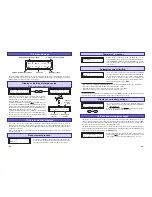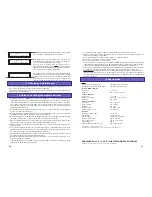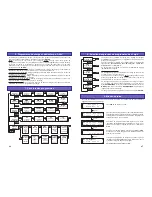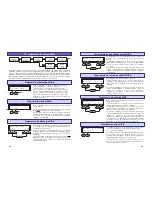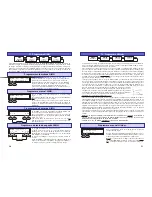
29
28
No. of NiCd balancing cycles
NiCd balancing program
NiCd capacity test program
_ _ _ _ _ _ _ _ _ _ _ _ _ _ _ _
_ _ _ _ _ _ _ _ _ _ _ _ _ _ _ _
n u m b e r
o f
c y c l e s
1
c y c l e s
DEC
INC
+
-
_ _ _ _ _ _ _ _ _ _ _ _ _ _ _ _
_ _ _ _ _ _ _ _ _ _ _ _ _ _ _ _
N i C d
b a l a n c e
D : 2 . 5 A
C : 2 . 5 A
DEC
INC
+
-
DEC
INC
+
-
ENTER
_ _ _ _ _ _ _ _ _ _ _ _ _ _ _ _
_ _ _ _ _ _ _ _ _ _ _ _ _ _ _ _
N i C d
c a p a c i t y
C : 2 . 5 A
D : 2 . 5 A
DEC
INC
+
-
DEC
INC
+
-
ENTER
The purpose of this program is to determine the capacity of a
battery. The program first charges the battery using the set
charge current stated on the left of the screen (0.1 ... 5.0 A or
automatic), and then discharges it again using the set dischar-
ge current stated on the right of the screen. At the end of the
process the screen displays the battery’s capacity.
The
charge
process is terminated automatically, in accordance
with the values entered in the user settings for “NiCd - Delta
Peak - termination voltage”, “Charge termination delay” and “Safe-
ty timer”. The safety timer is only active during charge.
This program is designed to even up, or balance, the condition
of a battery’s cells, and thereby optimise the pack’s capacity. It is
particularly useful with brand-new packs, as they do not attain
their full nominal capacity until they have been subjected to 10
or more charge cycles in any case. The program discharges the
pack using the set discharge current (0.1... 3.0 A or automatic)
stated on the left of the screen, then recharges it using the set
charge current (0.1 ... 5.0 A or automatic) stated on the right of
the screen.
The
charge
process is terminated automatically, in accordance
with the values entered in the user settings for “NiCd - Delta
Peak - termination voltage”, “Charge termination delay” and “Safe-
ty timer”. The safety timer restarts at the beginning of each
charge
cycle, and is only active during the charge phase.
The method of accessing the values for the individual cycles is
described in the section “Screen messages”.
In this program you can select the number of charge / discharge
processes to be used in the NiCd balancing program.
The available range is 1 ... 10 cycles.
In practice, no more than 2 or 3 cycles are required.
You should only set a higher number of cycles for a battery
which is particularly reluctant to accept charge, as frequent ba-
lancing reduces the useful life of the battery.
For safety reasons the number of cycles is reset to “1” every time
you connect the charger to the car battery. You must therefore
set the value to your requirements each time you use the char-
ger.
NiCd conditioning program
_ _ _ _ _ _ _ _ _ _ _ _ _ _ _ _
_ _ _ _ _ _ _ _ _ _ _ _ _ _ _ _
N i C d
c o n d i t i o n
D : 2 . 5 A
C : 2 . 5 A
DEC
INC
+
-
DEC
INC
+
-
ENTER
This program is designed for refreshing a battery shortly before
use, and can also be used to reduce the so-called memory
effect. The program discharges the battery using the set di-
scharge current stated on the left of the screen (0.1 ... 3.0 A or
automatic), and then recharges it using the charge current (0.1
... 5.0 A or automatic) shown on the right of the screen.
The charge process is terminated automatically, in accordance
with the values entered in the user settings for “NiCd - Delta
Peak - termination voltage”, “Charge termination delay” and “Safe-
ty timer”.
NiCd manual charge program
NiCd discharge program
_ _ _ _ _ _ _ _ _ _ _ _ _ _ _ _
_ _ _ _ _ _ _ _ _ _ _ _ _ _ _ _
N i C d
m a n u a l
C : 2 . 5 A
DEC
INC
+
-
_ _ _ _ _ _ _ _ _ _ _ _ _ _ _ _
_ _ _ _ _ _ _ _ _ _ _ _ _ _ _ _
N i C d
d i s c h a r g e
2 . 5 A
4 . 8 V
DEC
INC
+
-
DEC
INC
+
-
ENTER
This program is selected when you simply wish to recharge a
battery using the set charge current.
You can adjust the charge current using the INC / DEC but-
tons, but only
before
you connect the pack for charging.
The charge process is terminated automatically, in accordan-
ce with the values entered in the user settings for “NiCd - Delta
Peak - termination voltage”, “Charge termination delay” and
“Safety timer”.
The typical purpose of this program is to determine the resi-
dual capacity of a transmitter, receiver or drive battery, or to
discharge the pack to a defined level.
In this program the charger discharges the pack using the
set discharge current (0.1 ... 3.0 A or automatic, left of screen)
until its voltage falls to the set final discharge voltage (0.5 ...
37.0 V or automatic, right of screen). The set final discharge
voltage should be a value of around 0.5 ... 0.9 V
per
cell, in
order to avoid the pack becoming deep-discharged. Deep-
discharging a pack runs a risk of individual cells suffering
reversed polarity.
10. NiCd programs
A set of convenient charge programs for recharging the
Ni
ckel-
C
a
d
mium batteries commonly used for
modelling applications. When the charge / discharge program is finished, the screen displays the name
of the charge program alternating with the message “completed”, together with the charge time, the last
(dis-) charge current, the charged-in (discharged) capacity and the battery voltage, and continues to do
so until you disconnect the battery. This information can often give you a useful indication about the Ni-
Cd pack’s charge characteristics and capacity, or warn you if the charger has incorrectly assessed the
pack as being “full”.
NiCd automatic charge program
_ _ _ _ _ _ _ _ _ _ _ _ _ _ _ _
_ _ _ _ _ _ _ _ _ _ _ _ _ _ _ _
N i C d
a u t o m a t i c
C : 2 . 5 A
l i m i t e d
DEC
INC
+
-
NiCd
balancing-
program
MODE
MODE
MODE
MODE
MODE
NiCd
AUTOMATIC-
program
NiCd
MANUAL-
program
NiCd
discharge
program
NiCd
conditioning-
program
NiCd
capacity test-
program
NiCd
cycle count
MODE
MODE
In this program the charger detects the types of battery
connected and adjusts the charge current accordingly, to
avoid overcharging the pack.
The maximum charge current can be set using the INC /
DEC buttons
before
you connect the battery to be
charged.
The charge process is terminated according to the values
set by the user for „NiCd Delta-Peak Termination Voltage“,
„Charge Termination Delay“ and „Safety Timer“.




















